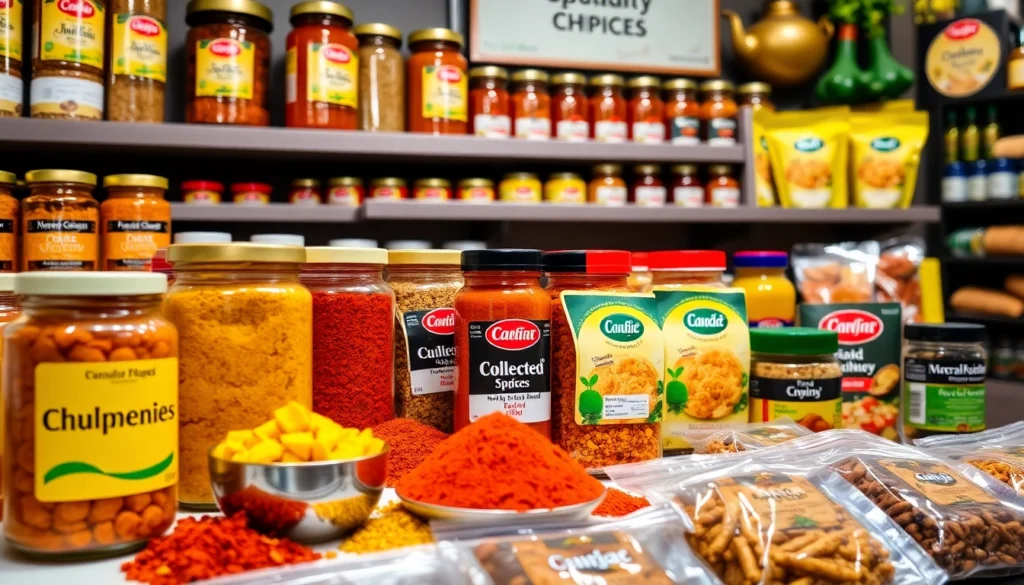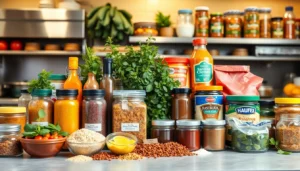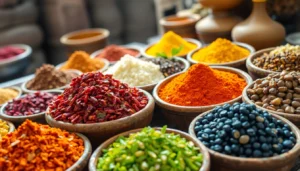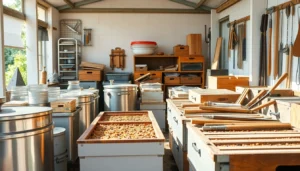Leading Manufacturer and Exporters of Spices, Pastes, and Flavorful Food Products in India

Understanding the Role of a Top Food Product Manufacturer and Exporter
In the dynamic world of the food industry, being a leading manufacturer and exporter requires more than just producing quality products; it demands a comprehensive understanding of international standards, exceptional manufacturing practices, and a keen awareness of market trends. Spice Nest exemplifies these qualities as a trusted products/services – Manufacturer, Suppliers, Exporters, Wholesalers Cooking Paste & Chutney, committed to delivering authentic, high-quality food products globally. Their presence at major food exhibitions worldwide reinforces their dedication to excellence and innovation in the food sector. This article explores what makes a top-tier food manufacturing and exporting company, focusing on quality standards, product range, manufacturing practices, market opportunities, and strategic partnerships.
Key qualities that make Spice Nest a trusted supplier
Trust in the food industry hinges on consistent quality, certifications, transparency, and customer-centric service. Spice Nest’s reputation is built on these pillars. They are certified by recognized bodies and have showcased their products at renowned international exhibitions, such as Biofach 2024, demonstrating compliance with stringent global food safety standards. Their diversified product portfolio, ranging from spices to ready-to-eat foods, allows them to serve a broad spectrum of customer needs. Furthermore, their commitment to authentic taste and preservation of traditional flavors positions them as a trusted partner in the food supply chain.
Critical to their credibility is adherence to manufacturing standards that guarantee product safety and hygiene. From sourcing high-quality raw materials to implementing rigorous quality control protocols, Spice Nest ensures every product meets international standards such as FSSC 22000, HACCP, and ISO certifications. Their transparency in operations and consistent delivery foster long-term relationships with global clients and end consumers alike.
How manufacturing standards impact product quality
Manufacturing standards directly influence the safety, consistency, and shelf life of food products. For companies like Spice Nest, investing in state-of-the-art production facilities, maintaining hygienic environments, and following strict SOPs are non-negotiable. For example, in spice processing, dedicated facilities for whole spices and powdered variants prevent cross-contamination crucial for allergen control and flavor integrity.
Additionally, quality assurance protocols such as microbiological testing, metal detection, and packaging integrity checks ensure that products remain safe and fresh until they reach consumers. Certifications like ISO 22000 and organic accreditation serve as proof of rigorous process adherence, which is vital for penetrating international markets where consumer safety is paramount.
Case studies reveal that strict compliance with manufacturing standards correlates with fewer product recalls, better customer satisfaction, and stronger brand trust. Implementing continuous improvement processes and adhering to recognized standards elevate a company’s reputation and operational efficiency.
Export processes and compliance with international food standards
Exporting food products involves navigating complex international regulations, documentation, and quality benchmarks. Spice Nest’s strategic approach includes thorough compliance with food safety norms such as the European Union’s FSS (Food Safety Standards), US FDA regulations, and others based on target markets. They ensure all products carry necessary certifications, such as Organic, HALAL, or HALAL, and adhere to labeling requirements to facilitate smooth customs clearance.
An efficient export process begins with meticulous documentation — including certificates of origin, quality testing reports, and bill of lading. Spice Nest leverages its experience participating in global trade shows and maintains close communication with overseas regulatory bodies to stay updated on evolving standards. Their proactive quality control, coupled with logistical expertise, ensures products arrive on time and intact, thereby reinforcing customer loyalty.
Comprehensive Range of Food Products and Their Applications
Spices: Whole and powdered varieties for diverse cuisines
Spices form the backbone of authentic flavor profiles in global cuisines. Spice Nest offers a vast selection of whole spices, such as black pepper, cinnamon sticks, and bay leaves, which are preferred for their freshness and aroma during cooking. Their powdered spices, including turmeric, chili powder, and garam masala, are processed under strict hygienic conditions to retain flavor integrity and potency. These products serve chefs and home cooks across India, Asia, Europe, and North America, enriching dishes like curries, stews, and marinades.
An example of innovation is their commitment to sourcing raw materials directly from sustainable farms, ensuring superior quality and traceability—a key factor for premium food producers seeking authenticity.
Cooking pastes and chutneys: Essential ingredients for flavorful dishes
Cooking pastes and chutneys simplify the culinary process while enhancing flavor complexity. Spice Nest’s range includes garlic paste, ginger paste, mint chutney, and traditional Indian chutneys like tamarind and schezwan. These are processed from fresh ingredients and preserved using modern techniques to extend shelf life without compromising taste. For instance, their Rajsthani-style Chilli Garlic Chutney caters to consumers seeking bold flavors.
These products are ideal for restaurants, catering services, and retail distributors aiming to prepare authentic dishes efficiently.
Sauces, pickles, and ready-to-eat foods for convenience and taste
The growing demand for convenient yet flavorful food options has propelled the popularity of sauces, pickles, and ready-to-eat meals. Spice Nest manufactures a variety of sauces, such as soy, chili, BBQ, and tangy tomato, tailored to meet international tastes. Their pickles, including mixed and garlic varieties, are crafted with traditional recipes and modern preservation methods.
Their readiness-to-eat products like Palak Paneer, Dal Makhani, and Navratan Korma offer quick meal options without sacrificing quality, catering to busy lifestyles and globalized palates.
Best Practices in Manufacturing and Packaging Food Products
Maintaining freshness and hygiene in spice and paste production
Ensuring product freshness requires controlled environments with optimal temperature and humidity controls. Spice Nest employs air handling systems, stainless steel equipment, and cleanroom practices that minimize contamination risks. Regular sanitation schedules and staff training reinforce hygiene standards, essential for a safe product portfolio.
Innovative packaging techniques for shelf stability
Packaging plays a vital role in preserving flavor, aroma, and nutritional value. Vacuum-sealed, retort pouches, and moisture-proof jars are common methods utilized by Spice Nest. They also employ nitrogen flush technology to prevent oxidation of spices and dry foods, extending shelf life and maintaining product integrity.
Quality assurance protocols and certifications
Rigorous quality checks at every stage—from raw material procurement to final packaging—are fundamental. Spice Nest’s certifications, including ISO 22000 and organic accreditation, reflect their commitment to continuous improvement. Regular microbiological testing, sensory evaluation, and compliance audits ensure products meet or exceed global quality benchmarks.
Market Trends and Opportunities in Food Exporting
Emerging consumer preferences for organic and authentic products
Consumers worldwide are increasingly seeking organic, natural, and authentic food items. This trend drives companies like Spice Nest to expand their organic ranges and emphasize transparency about sourcing and processing. The organic certifications and traditional recipes bolster consumer confidence and open doors to premium markets.
Participation in major trade shows and expanding global reach
Exhibitions like Biofach, Anuga, and Gulfood serve as strategic platforms for networking, showcasing innovations, and understanding evolving market demands. Spice Nest’s success at Biofach 2024 illustrates their proactive approach to market expansion and brand visibility, fostering collaborations with international distributors and retailers.
Strategies for building long-term relationships with international clients
Establishing trust through consistent quality, reliable delivery, responsive communication, and customized solutions is vital. Utilizing digital tools, offering product samples, and maintaining compliance with international standards facilitate sustained partnerships. Building a reputation for excellence cements long-term relationships and brand loyalty.
How to Choose a Reliable Food Manufacturer and Supplier
Factors to consider: certifications, product range, and production capacity
When selecting a manufacturer, ensure they possess necessary certifications like ISO, HACCP, Organic, and HALAL. A broad product range signifies the ability to meet diverse needs, while robust production capacity ensures scalability. Spice Nest’s expansive portfolio and quality certifications exemplify such reliability.
Ensuring product consistency and compliance standards
Consistent quality is achieved through strict SOPs, regular audits, and rigorous testing. Confirm that the supplier adheres to international compliance standards, and maintain open communication to align on quality expectations.
Building partnerships for business growth in the food industry
Strategic collaborations focus on mutual growth, innovation, and market expansion. Sharing technological expertise, co-developing products, and participating jointly in international trade events foster long-term relationships that benefit both parties.







